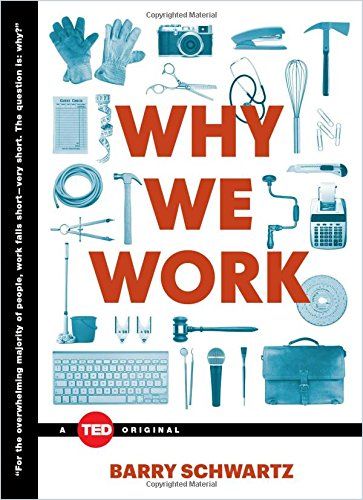Swarthmore psychology professor Barry Schwartz raises compelling theories backed by persuasive, albeit well-known, examples to explore what motivates you to work. Hint: Whatever it is, it’s not the money.

It Ain’t For Money
Swarthmore psychology professor and TED Talk speaker Barry Schwartz addresses issues surrounding work in contemporary life. He investigates why work alienates most people and touches on the myth that skilled professionals, financial wizards and creative people savor their work in ways members of the working class do not. Schwartz seeks to inspire you to consider the intersection of industry and individualism while offering singular, prescient insights into how work might corrupt, become corrupted, reward and punish.
Despite Schwartz’s willful absence of over-arching conclusions or directives, employers seeking to create better workplaces and anyone aspiring to a more meaningful work life will find that he offers myriad thought-provoking questions. Answers, not so much.
Blame Adam Smith
Schwartz contends that the most destructive fallacy about work isn’t that you have to pay people to do it. The worst fallacy is that to motivate adults or children, you must reward them with incentives and perks. If you figure out the right incentive, this theory goes, people will do what you want.
So it is unlikely that pay compensates for routinized meaningless work. More likely, such workers are resigned to living lives in which their work is nothing more than drudgery.Barry Schwartz
This false idea permeates economic thought and practice because Adam Smith eloquently argued for it in his seminal 1776 work, The Wealth of Nations. Smith felt anyone with any sense would want to work as little as possible. Therefore, people only work when you pay them, and work only for pay. Schwartz’s disagreement with this long-standing notion inspired his book.
The Value of Work
Schwartz cites interviews conducted with hospital custodians. Their duties included cleaning toilets, tidying patient rooms, and sweeping and mopping floors. But the custodians hardly spoke of these quotidian tasks. Each explained that doing his or her job makes patients more comfortable or eases the stress on a patient’s family. The janitors looked beyond their repetitive labor to align themselves with their hospitals’ spiritual purpose — to heal and give succor.
When people are able to do work they value, it makes them happy. It enhances their well-being. Much more than the material benefits that come from the incentive schemes that employers substitute for good work.Barry Schwartz
Schwartz leaps from this revelation to the idea that people who regard their work as a calling enjoy a greater engagement. Less convincingly, Schwartz argues that these people’s sense of their own worth supplies all the motivation they need.
Ideals
Schwartz cites Ray Anderson, the late CEO of Interface, a successful carpet manufacturer. Concerned that his grandchildren would inherit a polluted world, Anderson reduced his company’s electricity use by 50% and cut its waste by 90%, without reducing profits. Inspired by Anderson’s switch to a less hierarchical structure that gave workers a greater say and made them more productive, Schwartz draws the rather obvious conclusion that successful firms improve the lives of their employees as well as their customers.
Integrity
To ensure honorable behavior, many companies use specific incentives and goals to enforce rules that tell people how to do their work. Schwartz debunks this line of thinking. He asserts that integrity drives people to perform well, but rules and incentives undermine workers’ humanity.
Motives
A study of US students who took the Law School Admissions Test (LSAT) demonstrates how people misconstrue other people’s motives while remaining sure their own motives are above reproach. Researchers asked students to cite their reasons for choosing a legal career and to describe what they perceived as their peers’ motives. In this survey, 64% cited their personal “interest in the law” or intellectual challenges. But only 12% ascribed the same noble motives to their contemporaries. A full 62% believed everybody else wanted to be a lawyer to make more money. Schwartz concludes that people tend to ascribe commercial motives to everyone except themselves.
So either satisfying work is not for everybody, or unsatisfying work is the price we pay for material prosperity, or both. Both of these answers to the “why” (work) question are implausible. And both of these answers are wrong. Barry Schwartz
Schwartz uses this example to describe how ideas, ideologies and theories hold great power over people’s judgment. This tendency is so strong that people will cling to an idea even when confronted with clear evidence that contradicts it. Schwartz traces the origin of the word “ideologue” to Napoleon, who coined the term to describe people “so in love with ideas” they disregard any contradictory evidence.
Deep-Seated Intuitions
Schwartz cites Jonathan Haidt’s book The Righteous Mind, which contends that “moral commitments” don’t derive from rational thought. Instead, Haidt argues, most people’s strong moral stance derives from internal intuitions so deeply rooted that the conscious mind seldom perceives them. Haidt — and Schwartz — believe people unconsciously make up their minds long before they think through an issue. They apply reason the way attorneys use evidence in a courtroom: To build a case for beliefs they already hold.
Ideology
Schwartz breaks down how ideologies function in life. Like everyone else, he wondered how an idea can have a stronger influence than the rational evidence that refutes it. He reports in response that a pervasive idea can alter how people regard their behavior. Theories can become distorted mirrors of people’s actions and motivations.
As long as people were getting paid for what they did, it didn’t matter very much what that entailedBarry Schwartz
Ideologies also take hold through self-fulfilling prophecies. Schwartz argues that if you think people are lazy, would rather not work and only care about how much they earn, then your self-fulfilling prophecy will lead you to establish that dynamic in your workplace. But if you observe the people around you with care, you may find that their motives are honorable.
Questions, Not Answers
Unfortunately, Schwartz doesn’t fully answer the questions he raises, but perhaps no one can. He jumps from subject to statistics-filled subject, often with illuminating results. However, his data concerning the percentages of US workers who feel disengaged seems less fresh than his other information because these numbers crop up in many workplace analyses. Schwartz’s earnestness may hold your interest for a while, but after reading 50 or so pages of his 96-page book, you may wish he would or could make a stronger case that his disparate threads tie together into useful conclusions.
Barry Schwartz’s other books include Brilliant: The Art and Science of Making Better Decisions; The Paradox of Choice: Why More Is Less; Practical Wisdom: The Right Way to Do the Right Thing; The Battle for Human Nature: Science, Morality and Modern Life; and The Costs of Living: How Market Freedom Erodes the Best Things In Life.













